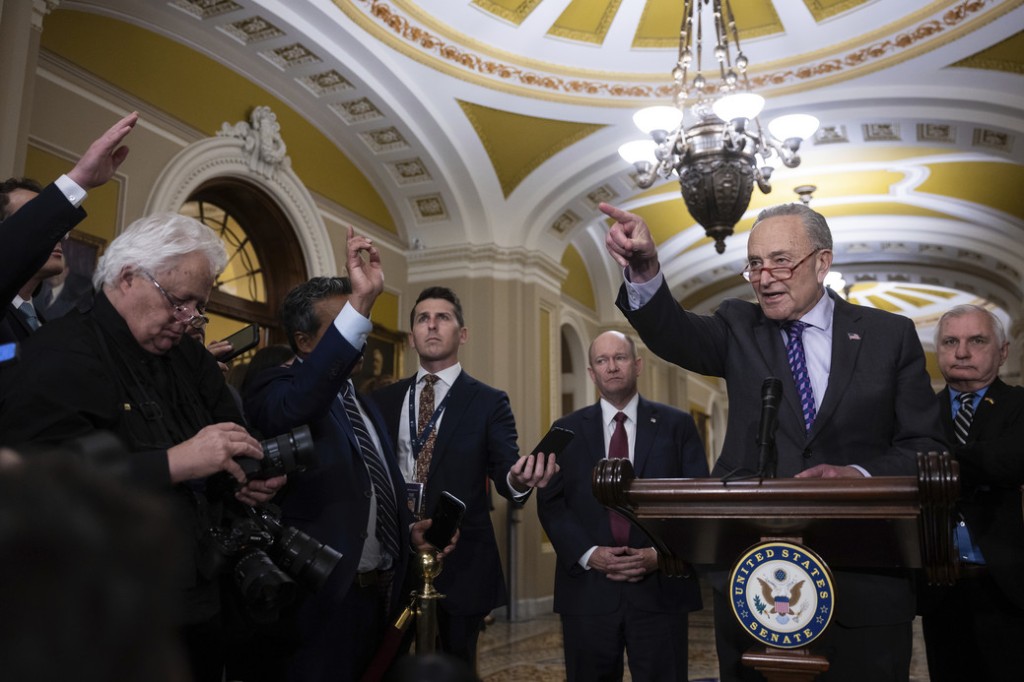Senate Majority Leader Chuck Schumer is setting the Senate on course for a failed vote this week on President Biden’s $106 billion request for Ukraine, Israel and border funding.
His hope: That the prospect of defeat is enough to make both sides get serious about a deal.
Schumer moved to set up a vote for Wednesday that will almost certainly fail due to the ongoing border security negotiations that hit an impasse in recent days. Given the intractable problems that bipartisan negotiators are finding as they search for a workable deal on the border, some senators think at least a looming deadline will help them focus.
Sen. Thom Tillis (R-N.C.), one of the negotiators, said that the failed vote could be “a necessary next step.” Tillis argued that if senators can’t get a border deal “that’s going to reduce future flows [of migration], then take the vote. It will fail, and then we’ll go from there.”
A Democratic senator, speaking on condition of anonymity, agreed that Schumer’s move might help: “That’s going to create a lot of smelling salts to wake people up to the crisis and the urgency,” the Democrat said, adding that “it creates even more urgency … deadlines and emergencies and last minute snatching defeat out of the jaws of victory seems to be par for the course” for these types of negotiations.
The stakes are higher for this week’s vote than for most filibusters by the Senate minority party. Even if it’s a predictable and easily forecast vote, this isn’t a partisan messaging bill in the traditional sense — it’s a massive tranche of aid to help some of the nation’s closest allies.
Ukraine President Volodymyr Zelensky will address senators in a closed briefing on Tuesday, cranking up the stakes even further.
People in both parties argue the Senate can’t fail in the end, even though the bill’s failure on the Senate floor will certainly look like failure. As Schumer put it, “if Ukraine falls, Putin will keep on going.”
Sen. Chris Murphy (D-Conn.), whose pessimism on Monday drove an entire day’s forecast of dire prognosis about the border negotiations, implored his Republican colleagues to vote to advance the bill. Wednesday’s vote will technically try to break a GOP filibuster stopping the chamber from starting to debate the bill; sometimes the Senate advances a bill that doesn’t yet exist to help buy time for high-stakes talks.
“We need to get on the bill, so if we do come to an agreement, that we can move quickly. The Senate moves really slowly,” Murphy said. “I hope we don’t lose the vote. I hope the Republicans understand that they can vote to get on the bill … to try to get to a final conclusion.”
Republicans don’t see it that way. They’ve warned for several weeks now that they would block a vote to move forward on Biden’s aid request absent a border deal, and they say they have to make good on that vow.
Although negotiators have made progress on asylum reform, it appears discussions over parole and other more restrictive measures are now on ice, perhaps until after the failed vote. Which “it will certainly fail” on its current trajectory, said Sen. James Lankford (R-Okla.), another lead border negotiator.
“I don’t want to have a failed vote on anything,” Lankford said. “I don’t think that proves anything other than everyone knows where we are on this, that we really want to be able to secure the border. And Democrats have been very outspoken that they want to do a little bit on the border, but leave it open.”
So just how far apart are the two sides? Murphy estimated that the two parties are about a week or more away from an agreement. He said he’s done negotiating with Lankford until his partner across the aisle moves more toward the middle.
Lankford said that he and Murphy are still talking and said the negotiations haven’t stopped.
“To me, we’re going to get it resolved,” he said.
The Informant via POLITICO





Leave a comment